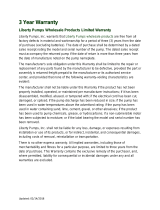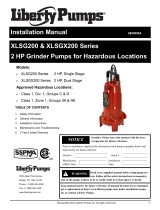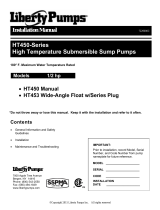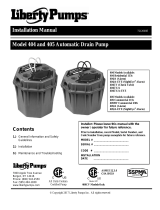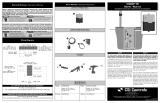
© Copyright 2017 Liberty Pumps Inc. All rights reserved 3
Safety Information
NEVER enter a flooded space without
proper Personal Protective Equipment.
Always wear dielectric rubber boots and
other applicable protective equipment
when water is on the floor and you must
service an energized pump or alarm
system.
NEVER install this alarm system outdoors.
The system is rated for indoor use only.
DO NOT enter the water if the water level
is higher than that of the protection your
PPE offers or if your PPE is not
watertight.
DISCONNECT POWER before installing
or servicing this product. A qualified
service person must install and service
this product according to applicable
electrical and plumbing codes.
NEVER use this product with or near
flammable liquids.
DO NOT install this product in locations
classified as hazardous or in explosive
atmospheres as defined by any
applicable electrical safety code.
RISK OF ELECTRIC SHOCK
RISK OF FIRE
Failure to follow the above precautions could result in serious injury or death. Replace product
immediately if sensor or power cable becomes damaged or severed. Keep these instructions in a safe
place for future reference. This product must be installed in accordance with National Electric Code,
ANSI/NFPA 70 so as to prevent moisture from entering or accumulating within junction boxes, conduit
bodies, fittings, float housing, alarm enclosure, or cable.
General Information
Before use, please read the following instructions carefully. Each Liberty Pumps alarm system is tested individually in
the factory to ensure proper performance and operation. Closely following these instructions will eliminate potential
operating problems, providing years of trouble-free service.
This high water level alarm system is designed for applications such as monitoring sump pump basins, sewage pump
basins, and water powered back-up pumps. The alarm system comes standard with a 9V battery back-up to enable
continuous water level monitoring, even when the power is out. A built-in battery monitor alerts the user when the 9V
battery needs to be replaced.
NightEye
®
enabled devices come equipped with wireless internet connectivity. These devices can connect to your
wireless network, by means of an Android
®
or iOS
®
device, and send notifications about your system in real time. This
system can provide peace of mind about the status of your sump pump system even when you are not home.
All of the alarms come standard with Liberty Pumps’, patent pending, 360° red alarm beacon powered by super-bright
LEDs. In combination with the 86dB (at 10’ (3m)) alarm siren, the alarm is sure to alert occupants of the high-water
condition.
Each device is specifically designed for use in an indoor residential wastewater application. The systems come with
liquid level sensors that conform to the needs of the intended application. The sensor types are as follows:
Snap-on enclosed float - (ALM-P1, ALM-P1-EYE, SJ10A, SJ10A-EYE) - Sump Pump Applications
Tethered float - ( ALM-2, ALM-2-1, ALM-2-EYE, ALM-2-1-EYE) - Sewage Pump Applications
Water puck - (ALM-PK, ALM-PK-EYE) - Puddle Sensing.
If you need one alarm to monitor multiple locations, Liberty offers a splitter to connect up to 3 sensors (Kit: K001633).
© Copyright 2017 Liberty Pumps Inc. All rights reserved 1






